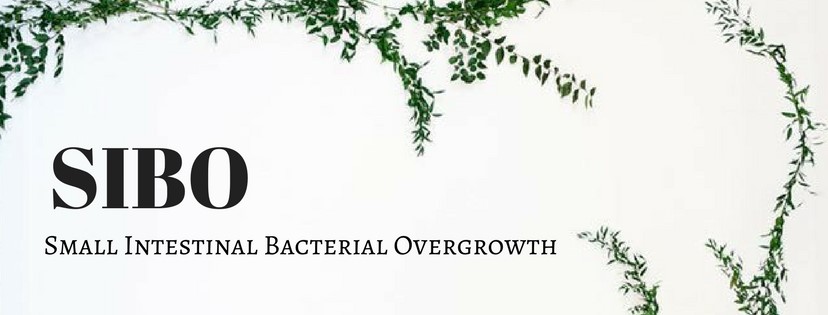by Leia Mulroy (Nutritionist)
Small Intestinal Bacterial Overgrowth (SIBO) is defined as the presence of an abnormally high number of bacteria in the small bowel. What is unique about SIBO is that the excessive numbers of bacteria colonizing the small intestine, a region usually containing few bacterial populations, are the species that are predominantly found in the large intestine.
The SIBO hypothesis proposes that it is this expansion of bacteria into the small intestine from the large intestine that leads to symptoms including bloating, abdominal discomfort, flatulence, and changes in stool form.
Given the role of the gut microbiome in health and disease states, underlying imbalances in the microbiome (also known as dysbiosis) have also been linked to the development of numerous gastrointestinal and systemic disorders including inflammatory bowel disease, diabetes, obesity, cardiovascular disease, and disorders of mood and behaviour.
What risk factors are associated with SIBO?
There are several factors involved in the pathogenesis of SIBO that have in common a disruption in the natural protective antibacterial mechanisms of the gut.
These can include a combination of intrinsic and extrinsic factors that can play a role in alteration of the gut microbiome. This can also include a broad range of predisposing small intestinal motility disorders and with surgical procedures that result in bowel stasis.
Below is a list of contributing factors associated with SIBO:
- Achlorhydria (low stomach acid)
- Dysbiosis
- Undiagnosed food intolerances and allergies
- Structural abnormalities
- Systemic and intestinal immune deficiency states
- Partial obstruction of small bowel (stricture, adhesions, tumours)
- Large and/or small intestine diverticulosis
- Systemic diseases (celiac disease, diabetes, non-alcoholic fatty liver disease)
- Alcoholism
- FODMAPs (fructose, lactose, galactans, fructans, sugar alcohols)*
- Proton pump inhibitors (Reflux Medication)
- Stress
- Fibre
- Antibiotics
* FODMAPs is an acronym for a group of highly fermentable foods
How do you know if you have SIBO?
Bacterial overgrowth may manifest silently, without overt clinical signs. Patients without clear symptoms of gastrointestinal distress may benefit from testing, especially those with a history of chronic constipation, diarrhoea, use of reflux medications, or maldigestion.
Currently, Hydrogen and Methane breath testing is the most commonly used procedure for diagnosing SIBO. This is a non-invasive procedure that can be done at home. If bacteria are excessive in the small intestine (as seen in SIBO), they will ferment the lactulose challenge drink and produce hydrogen and/or methane gas(es). The levels of hydrogen and methane gas are then measured in the breath and a diagnosis is confirmed.
Clinical manifestations commonly seen in SIBO can include the following:
- Irritable Bowel Syndrome (IBS)
- Bloating, Flatulence, Reflux
- Abdominal distension and/or Pain
- Constipation and/or Diarrhoea
- Unexplained weight loss
- Malnutrition
- Nutrient deficiencies such as Vitamin B12, Iron, Vitamin D, E, A and K.
What are the treatment options?
Once the bacterial overgrowth has been detected, intervention strategies involving natural herbal and nutritional therapies such as anti-microbials, digestive support and diet can be used to treat the condition. Treatment for SIBO can last between 8-12 weeks depending on the patient’s conditions and severity.
The main treatment phases include:
1. Treating the underlying cause (Medications, Digestion, Food intolerances, Parasites)
2. Eradication of the overgrowth (Herbal Antimicrobials, Diet, lifestyle)
3. Address associated nutrient deficiencies (Natural supplementation if needed)
4. Repair and heal the gastrointestinal tract (Probiotics, Gut healing nutrients)
Herbal Therapy
Several well-documented botanical extracts have been shown to exhibit strong antibacterial and antimicrobial activities that can inhibit the growth of intestinal microbes (Chedid et al, 2014).
These include Oil of Oregano, Phellodendron, Thyme, Horsetail, Wormwood, Pomegranate and Garlic (Chedid et al, 2014).
In 2014, a study concluded by Chedid et al, compared antibiotic therapy (Rifaximin) v’s herbal antimicrobials for the treatment of SIBO. The study found that patients who were treated with the herbal therapy responded with fewer side effects and lower relapse rates. The herbals were also shown to be as effective as triple therapy antibiotic treatment for Rifaximin non-responders.
Nutritional Therapy
Probiotics
Probiotic bacteria act by enhancing the epithelial barrier function, modulating the immune system and by binding and adhering to the intestinal epithelium and mucosa (Soifer et al, 2010).
Probiotics containing Lactobacillus casei, Plantarum, Streptococcus Faecalis and Bifidobacterium Brevis have shown beneficial effects on many gastrointestinal disorders and symptoms such as bloating, abdominal distention, IBS and Dysbiosis (Soifer et al, 2010).
Intestinal lining repair work & resolution of intestinal permeability may only be begin once digestive symptoms are under control Nutrients such as L-glutamine, zinc, vitamin A, Vitamin D, and essential fatty acids can improve gut lining integrity.
Diet
During the initial treatment phase of SIBO, it is advised to follow a diet based on limited intake of carbohydrates, starches, refined and natural sugars, including fruits. This reduces the fermentation of excess starches and sugars in the bowel, thus reducing symptoms such as bloating and pain.
A personalised diet plan throughout the stages of a SIBO treatment plan is important to reduce symptoms, improve bacterial eradication and promote gut healing in each patient. As each person will have their own unique predisposing factors that contribute to SIBO, it is important to work with a practitioner that can design a program specifically for you.
Lifestyle
Busy day-to-day lifestyles can have an impact on our hormones, sleep, immune system and digestion. Over worked nervous systems can put pressure on our digestive tract and result in conditions such as SIBO and maldigestion. Supporting the bodies stress response is just as important and the initial gut treatment itself. Other supporting therapies found to reduce symptoms and support the nervous system include acupuncture, yoga, massage, meditation, psychotherapy, cognitive and behavioural therapies.
If you are currently struggling with digestive complaints such as SIBO always consult with a qualified Nutritionist or Naturopath prior to commencing any treatment.
If you have an questions please contact Leia Mulroy on leia_mulroy@hotmail.com or lick click here to book a consultation.
All references available upon request



